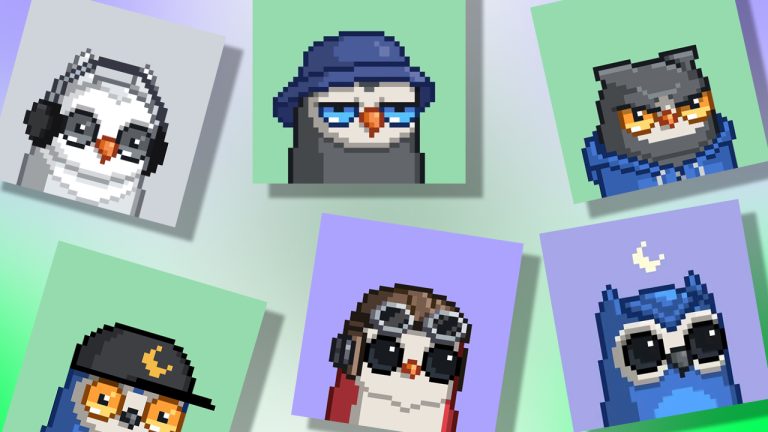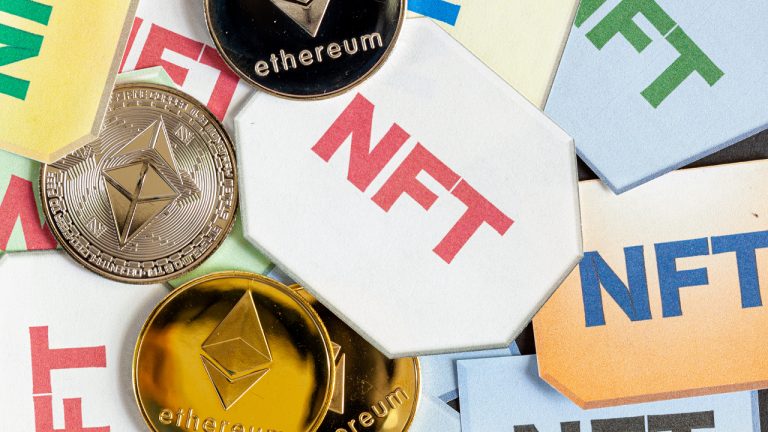 Friday saw Yuga Labs, known for creating the Bored Ape Yacht Club (BAYC) non-fungible token (NFT) series, unveiled its acquisition of Proof, a notable NFT startup behind the Moonbirds collection. Kevin Rose, founder of Proof, will assume an advisory role within Yuga, and the startup’s team plans to integrate into the Yuga framework. Moonbirds NFT […]
Friday saw Yuga Labs, known for creating the Bored Ape Yacht Club (BAYC) non-fungible token (NFT) series, unveiled its acquisition of Proof, a notable NFT startup behind the Moonbirds collection. Kevin Rose, founder of Proof, will assume an advisory role within Yuga, and the startup’s team plans to integrate into the Yuga framework. Moonbirds NFT […]
Only 11,440 NFT traders were active on March 11 which was the lowest figure recorded since November 2021.
Nonfungible token (NFT) trading volumes took a massive beating following the collapse of Silicon Valley Bank (SVB) last week as traders fled the markets fearing the repercussions of a major United States bank going under.
According to a March 16 report from data aggregation platform DappRadar, NFT trading volumes were hovering between $68 million to $74 million in the lead-up to SVB’s collapse on March 10, then fell to $36 million on March 12.
The dip was accompanied by a 27.9% drop in daily NFT sales count between March 9 to March 11.

11,440 NFT traders were “active” on March 11 also, the lowest figure recorded since November 2021 according to DappRadar.
The report explained the depeg of USD Coin (USDC) which hit as low as $0.88 moved trader attention away from the NFT market:
As a result “NFT traders became less active,” Dappradar explained.
Despite the trading chills the market value of “blue chip” NFTs was not materially impacted, with the floor prices of collections such as the Bored Apes Yacht Club (BAYC) and CryptoPunks only slightly falling.

“The recovery was quick, showing the resilience of these top-tier NFTs,” DappRadar said. “Blue-Chip NFTs remain a steady investment in a disrupted market.”
The steady floor prices of the BAYC and CryptoPunks may be attributed to the firm behind the collections, Yuga Labs, confirming it only had a “super limited exposure” to SVB, according to co-founder Greg Solano.
Related: 74% of survey participants say they buy NFTs for status
However, the floor price of the Moonbirds collection fell a significant 35.3% from 6.18 ETH to 4 ETH on OpenSea, following the news that PROOF — the team behind the NFTs — had considerable exposure to SVB.

This was partially triggered by one Ethereum address selling off almost 500 Moonbirds NFTs for losses ranging between 9% to 33%, DappRadar explained.
The sell-offs on the NFT marketplace Blur totaled a loss of 700 Ether (ETH).
 Non-fungible token (NFT) sales have soared this past week, climbing 138.15% higher than the week before. Sales recorded between last Friday and Feb. 24, 2023, indicate that $801 million in NFT sales have been settled over the last seven days. Ethereum Digital Collectibles and Mutant Ape Yacht Club Lead NFT Sales Surge While crypto asset […]
Non-fungible token (NFT) sales have soared this past week, climbing 138.15% higher than the week before. Sales recorded between last Friday and Feb. 24, 2023, indicate that $801 million in NFT sales have been settled over the last seven days. Ethereum Digital Collectibles and Mutant Ape Yacht Club Lead NFT Sales Surge While crypto asset […] Sales of non-fungible token (NFT) assets over the last seven days rose 43.97% compared to the previous week, according to statistics recorded on Feb. 18, 2023. The volume of NFT sales reached $397.86 million this week, with 345,716 NFT buyers and roughly 1.62 million transactions. NFT Sales Continue to Rise in 2023, Ethereum Dominates NFT […]
Sales of non-fungible token (NFT) assets over the last seven days rose 43.97% compared to the previous week, according to statistics recorded on Feb. 18, 2023. The volume of NFT sales reached $397.86 million this week, with 345,716 NFT buyers and roughly 1.62 million transactions. NFT Sales Continue to Rise in 2023, Ethereum Dominates NFT […]
Among the nonfungible tokens (NFTs) stolen from the PROOF co-founder were 25 Chromie Squiggles and one Autoglyph NFT.
Kevin Rose, the co-founder of the nonfungible token (NFT) collection Moonbirds, has fallen victim to a phishing scam leading to more than $1.1 million worth of his personal NFTs stolen.
The NFT creator and PROOF co-founder shared the news with his 1.6 million Twitter followers on Jan. 25 asking them to avoid buying any Squiggles NFTs until they manage to get them flagged as stolen.
I was just hacked, stay tuned for details - please avoid buying any squiggles until we get them flagged (just lost 25) + a few other NFTs (an autoglyph) ...
— KΞVIN R◎SE (,) (@kevinrose) January 25, 2023
“Thank you for all the kind, supportive words. Full debrief coming,” he then shared in a separate tweet about two hours later.
It is understood that Rose’s NFTs were drained after signing a malicious signature that transferred a significant proportion of his NFT assets to the exploiter.
GM – what a day!
— KΞVIN R◎SE (,) (@kevinrose) January 25, 2023
Today I was phished. Tomorrow we'll cover all the details live, as a cautionary tail, on twitter spaces. Here is how it went down, technically: https://t.co/DgBKF8qVBK
An independent analysis from Arkham found that the exploiter extracted at least one Autoglyph (345 ETH), 25 Art Blocks — also known as Chromie Squiggle — (332.5 ETH) and nine OnChainMonkey items (7.2 ETH).
In total, at least 684.7 ETH ($1.1 million) was extracted.
While several independent on-chain analyses have been shared, Vice President of PROOF — the company behind Moonbirds — Arran Schlosberg explained to his 9,500 Twitter followers that Rose “was phished into signing a malicious signature” which allowed the exploiter to transfer over a large number of tokens:
1/ This was a classic piece of social engineering, tricking KRO into a false sense of security. The technical aspect of the hack was limited to crafting signatures accepted by OpenSea's marketplace contract.
— Arran (@divergencearran) January 25, 2023
Crypto analyst “foobar” further elaborated on the “technical aspect of the hack” in a separate post on Jan. 25, explaining that Rose approved a OpenSea marketplace contract to move all of his NFTs whenever Rose signed transactions.
He added that Rose was always “one malicious signature” away from an exploit:
be super careful when signing anything, even offchain signatures. kevin rose just had ~$2 million worth of NFTs drained from his vault from signing one malicious seaport bundle. thankfully a couple things held back, like the punk zombie (1000 ETH) which can't be traded on OS pic.twitter.com/GXHR3NQHLf
— foobar (@0xfoobar) January 25, 2023
The crypto analyst said Rose should have instead been “siloing” his NFT assets in a separate wallet:
“Moving assets from your vault to a separate "selling" wallet before listing on NFT marketplaces will prevent this.”
Another on-chain analyst, “Quit” told his 71,400 Twitter followers further explained that malicious signature was enabled by the Seaport marketplace contract — the platform which powers OpenSea:
Kevin Rose was just lost $2m+ in assets by signing an off-chain signature that created a listing for all of his OpenSea approved assets in one go.
— quit (@0xQuit) January 25, 2023
While seaport is a powerful tool, it can also be dangerous if you're not aware of how it works.
A bit of context 1/
Quit explained that the exploiters were able to set up a phishing site that was able to view the NFT assets held in Rose’s wallet.
The exploiter then set up an order for all of Rose’s assets that are approved on OpenSea to then be transferred to the exploiter.
Rose then validated the malicious transaction, noted Quit.
Related: Bluechip NFT project Moonbirds signs with Hollywood talent agents UTA
Meanwhile, foobar noted that most of the stolen assets were well above the floor price, which means that the amount stolen could be as high as $2 million.
Quit urged that OpenSea users “need to run away” from any other website that prompts users to sign something that looks suspicious.
On-chain analyst “ZachXBT” shared a transaction map to his 350,300 Twitter followers, which shows that the exploiter sent the assets to FixedFloat — a cryptocurrency exchange on the Bitcoin layer-2 “Lightning Network.”
The exploiter then transferred the funds into Bitcoin (BTC) and before depositing the BTC into a Bitcoin mixer:
Three hours ago Kevin was phished for $1.4m+ worth of NFTs. Earlier today the same scammer stole 75 ETH from another victim.
— ZachXBT (@zachxbt) January 25, 2023
Mapping this out we can see a clear trend of sending the stolen funds to FixedFloat and swapping for BTC before depositing to a bitcoin mixer. https://t.co/2yrFpfYttT pic.twitter.com/ZlywPYydwx
Crypto Twitter member "Degentraland” told their 67,000 Twitter followers that it was the “saddest thing” they have seen in cryptocurrency space to date, adding that if anyone can come back from such a devastating exploit, “it’s him”:
Saddest thing I've seen in crypto to date.@kevinrose wallet drained.
— Degentraland (@Degentraland) January 25, 2023
If anyone can come back from this, it's him. pic.twitter.com/HZysg34qji
Meanwhile, Bankless founder Ryan Sean Adams was enraged with the ease at which Rose was able to be exploited. In the Jan. 25 tweet, Adams urged front-end engineers to pick up their game and improve user experience (UX) to prevent such scams from taking place.

PROOF Co-founder Kevin Rose announced the deal via Twitter on Jan. 6, noting that the aim is to get the Moonbirds brand recognized on a global scale and not just in the Web3 space.
The NFT-focused company was founded by early-stage Facebook and Twitter investor Kevin Rose, and designer Justin Mezzell in February 2022. The company also has the Proof Collective and Oddities NFT collections in its catalog.
Announcing the move via Twitter on Jan. 6, Rose suggested that the goal of the deal is to get the Moonbirds brand known on a “global” mainstream scale, as opposed to just being recognized as a big hitter in the Web3 space.
“What does UTA bring to the table? They are 1,400 people strong, with divisions in film, television, music, video games, sports, books, branding and licensing, speaking, marketing, fine arts, broadcast, and more,” he said.
PROOF, the company behind the top-tier NFT project Moonbirds, has signed a representation deal with major Hollywood talent agents United Talent Agency (UTA).
:)
— Gary Vaynerchuk (@garyvee) January 6, 2023
Explaining the move a bit further, Rose noted that UTA will work on PROOF’s behalf to help “vet, broker, and execute partnerships and expansion opportunities across a variety of fields.”
The Ethereum-based Moonbirds project launched in April 2022 and consists of 10,000 8-bit owl-themed avatar NFTs. To date, it has generated roughly $619.5 million worth of secondary sales according to data from CryptoSlam.
That figure makes Moonbirds the eleventh highest-selling collection on the NFT market, with its nearest competitors being twelfth-placed Doodles at $553 million and tenth-placed CloneX at $794.9 million.

Despite the supposedly bullish UTA announcement, Moonbirds’ 24-hour sales volume has dropped a hefty 57.86%, with $442,747 worth of Moonbirds NFT changing hands during that time frame. Over a seven-day time frame however, trading volumes are still up by 63.74%.
The move from Moonbirds follows other big names in the NFT space to seek out Hollywood deals.
Related: Logan Paul threatens to sue Coffeezilla over CryptoZoo ‘scam’ allegations
CryptoPunks founders Larva Labs were the first ones to pave the way back in September 2021, signing a deal with UTA to represent the firm’s IP across TV, film, video games, licensing and publishing.
The next month Yuga Labs — which now owns CryptoPunks — followed suit by signing up with UTA to push the Bored Ape Yacht Club IP into movies, TV, music and gaming. While the most recent occurrence before PROOF was the deal between UTA competitors WME and NFT start-up Boss Beauties.

The customizable card will only support NFT avatars from select blue chip collections, subject to Mastercard’s design standards and an owner verification process.
Mastercard has launched customizable nonfungible token (NFT) debit cards, allowing some cardholders who own avatars from select NFT collections to add the artwork onto the payment's card.
The debit cards are made available through a Sept. 26 partnership with European cryptocurrency exchange platform, “hi” allowing its “Gold” members to personalize their debit cards with an NFT they verifiably own
Gold membership with the platform is obtained by staking a minimum of 100,000 hi Dollar’s (HI), the platform's native token, a sum worth around $4,600 according to data from CoinGecko.
NEWS! Today @hi_com_official launches the world’s first debit card featuring NFT Customization, allowing cardholders to personalize the face of their card with an NFT Avatar. Read more here https://t.co/awNVowcsuG pic.twitter.com/A5xFsHlX0w
— Mastercard Europe (@MastercardEU) September 26, 2022
The cards will allow spending in fiat money, stablecoins or any cryptocurrency the user holds and is accepted wherever Mastercard is available. Other features such as hotel credits, cash back incentives and rebates on Netflix and Spotify subscriptions are also touted as benefits of certain membership levels.
Mastercard’s Crypto and Fintech Enablement VP, Christian Rau said with consumer interest in NFTs and crypto growing the payments provider was “committed to making them an accessible payments choice for the communities who wish to use them.”
A limited range of NFT collections will be supported including CryptoPunk, Moonbirds, goblintown, Bored Ape and Azuki, owners of these NFTs will have to become Gold members with hi and verify their NFT ownership with the platform to receive their custom cards.
Additionally, the cards are available only within 25 European Economic Area (EEA) countries and the United Kingdom.
Related: Innovation will drive NFT adoption despite mainstream presence: NFTGo founder
With the wider downturn in crypto markets over the last few months most of the “blue chip” NFT collections took a price hit, but data by NFTGo shows the performance of blue-chip NFTs growing steadily since Sept. 12 possibly bringing renewed interest to the largest collections.
Mastercard has helped crypto payments go mainstream with its support for the assets, even allowing Mastercard holders the ability to purchase NFTs through partnering with multiple NFT marketplaces in June.
 Non-fungible token (NFT) sales managed to climb higher during the last seven days than the previous week’s overall sales. This week’s NFT sales managed to jump over 6.3% after recording more than $153 million in sales compared to last week’s $144 million. Non-Fungible Token Sales This Week Climb More Than 6% Higher, 2 NFT Collections […]
Non-fungible token (NFT) sales managed to climb higher during the last seven days than the previous week’s overall sales. This week’s NFT sales managed to jump over 6.3% after recording more than $153 million in sales compared to last week’s $144 million. Non-Fungible Token Sales This Week Climb More Than 6% Higher, 2 NFT Collections […] During the last few weeks, non-fungible token (NFT) sales have remained flat and data from the past seven days have shown NFT sales are down 8.11% lower than the week prior. Despite the downturn, a few NFT collections saw significant percentage increases in terms of sales as the collections like Electricsheep, Moonbirds, and Moonbirds Oddities […]
During the last few weeks, non-fungible token (NFT) sales have remained flat and data from the past seven days have shown NFT sales are down 8.11% lower than the week prior. Despite the downturn, a few NFT collections saw significant percentage increases in terms of sales as the collections like Electricsheep, Moonbirds, and Moonbirds Oddities […]
Data on the most well recognized nonfungible token (NFT) projects show that key metrics have fallen with floor prices and market capitalization over the past month.
“Blue-chip” nonfungible token (NFT) collections have seen their floor prices and market capitalization slide over the past 30 days, with some of the most well-recognized projects halving in value for these key metrics.
Data collected on key Ethereum (ETH) NFT projects by DappRadar show the floor prices of established collections such as CryptoPunks, Bored Ape Yacht Club (BAYC), Mutant Ape Yacht Club (MAYC), and Moonbirds, are at most down around 55% over 30 days.
The MAYC is the worst off of the four with the floor price diving 55% to 16.7 ETH ($31,300). The more popular BAYC has fallen over 47% to 86.7 ETH ($163,000), and CryptoPunks by almost 49% to 45 ETH ($85,000).
The only collection to gain in the month was Moonbirds up 22% with a 19.6 ETH floor price, roughly $37,000.
Whilst the floor price for Moonbirds may be up, its market cap has fallen 55% to $368 million. The others have also tumbled with the biggest losses being the MAYC, down over 71% to under $610 million, whilst BAYC and CryptoPunks were down 62% and 51% respectively.
Despite the falling metrics the collections still continue to dominate the top NFT sales over the past 30 days the most expensive being a BAYC NFT sold for 410 ETH on May 5, worth about $1.2 million at the time.
A free-to-mint NFT collection called Goblintown launched on May 22 now commands a nearly $50 million market cap and is in the top 30 NFT collections.
Despite the website stating the NFTs have “No roadmap. No Discord. No utility.”, Goblintown is in second place for volume over the last seven days at nearly $23 million according to DappRadar, beating out collections such as Otherdeeds and the Bored Ape Yacht Club.
The collection features 9,999 “goblins” which debuted without any real marketing, fanfare or the usual hype-building for a NFT project. The team behind Goblintown is not known and often post seemingly nonsensical and crude tweets from the official Twitter account.
ₐₐₐᵤᵤᵤᵤgggg ₙᵤₘbᵤᵣ ₒₙₑ pic.twitter.com/eLGl6ASJXI
— goblintown.wtf (@goblintownwtf) May 22, 2022
Despite all of these factors, the floor price of the collection was 2.7 ETH or around $5,000 on NFT marketplace OpenSea at the time of writing. The most expensive NFT sold from the collection has fetched a price of 69.4 ETH or about $130,000.
Imagine working on a NFT project for months, setting up collabs with the biggest projects/alpha groups, getting 200K followers engagement farming WL spot giveaways, then after mint everyone bricks the floor under mint price
— ashrobin (@ashrobinqt) May 22, 2022
goblintown: free mint, no collabs, no WL, no discord pic.twitter.com/bMiJoWufyg
RTFKT (pronounced “artifact”) the Web3 arm of sportswear and sneaker giant Nike has added an Ethereum Name Service (ENS) domain to the company's repertoire, purchasing “dotswoosh.eth” for 19.72 ETH, about $37,000.
Related: NFT 2.0: The next generation of NFTs will be streamlined and trustworthy
Whilst it’s unclear what use Nike will put the domain to, the company has been investing in Web3 through the creation of multiple sneaker-based NFT collections with RTFKT, and has defended its claim to the space, taking a reseller of Nike NFT sneakers to court.
The purchase of this latest ENS domain brings the total owned ENS domains by the company to ten.
The popular move-to-earn NFT game Stepn has banned users in China from its app to adhere to Chinese regulations. Mainland Chinese users make up 5% of the platform's overall user base and Stepn’s founder has said the move will not have a significant impact on the firm's finances.
The community for a Solana (SOL) based NFT game has dished out payback to a scammer after the developer of the game raised royalties to 98% on a batch of NFTs stolen in a Discord hack phishing scam. Community members bought back the NFTs to return them to their original owners whilst the hacker made a measly 2% on each sale.